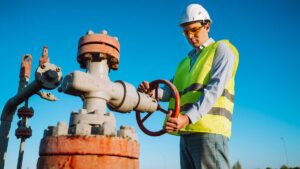These industry watchers want Oz to be more like the Norwegians and up the tax on oil and gas

Pic: Vertigo3d / E+ via Getty Images
One Australian think tank reckons Australia should follow Norway’s lead when it comes to cashing in on the country’s significant oil and gas resources.
The Australia Institute said in its submission to the Senate Standing Committee on Economics’ inquiry into Australia’s oil and gas reserves that Norway’s experiences suggested that super profit taxes could be as high as 78 per cent and still preserve the incentive to efficiently exploit the resource.
The inquiry will consider arrangements used by countries to maximise the benefit to the public of national oil and gas reserves, as well as arrangements that could exploit Australia’s reserves to the benefit of the public.
The Australia Institute also pointed to its previous research recommending that the current petroleum resource rent tax (PRRT) should be increased from the current 40 per cent to 70 per cent for projects that have earned double the uplifted value of their capital outlays, along with other measures to rationalise the PRRT and make it work more effectively.
Dr Cameron Murray at the Henry Halloran Trust, University of Sydney, also called on Australia to take a page out of Norway’s playbook, saying that it captured value from resources through its petroleum tax system, having direct ownership stakes in private oil producers and profits from a publicly-owned oil company.
While oil and gas companies will certainly have issues with his recommendations, it is Dr Murray’s call for producers to issue shares to the government with a value pegged to their total sales that is likely to have them (and their shareholders) howling.
Professor Clinton Fernandes from the University of New South Wales is another Norwegian fan who said that taxpayers should be entitled to equity in projects when share prices increase.
Unsurprisingly, industry bodies were opposed to this stance with the Australian Petroleum Production & Exploration Association (APPEA) saying that desktop comparisons between jurisdictions were unlikely to be of meaningful benefit as they did not paint a complete picture.
APPEA noted that comparisons with the effective 78 per cent tax on profit in Norway did not take into consideration the significant government incentives and risk absorption that occur in that jurisidiction.
This includes annual refunds of up to 78 per cent for exploration costs and allowing losses to be carried forward without limitation.
APPEA added that continued growth and investment of the oil and gas industry would be on the back of stable political, economic and tax policies, warning that global investment capital is scarce and will always go to the best commercial projects.
This received support from the Business Council of Australia, which said the existing resource tax arrangements had worked appropriately to date.
The council added that the stability and certainty of Australia’s existing resource tax regime had helped to encourage over $200 billion worth of investment in petroleum projects over the past few years.
Less controversially, The Australia Institute called for the establishment of a sovereign wealth fund that would collect windfall profits from commodity price fluctuations, which would reduce the risk of amplifying the boom and bust cycle while preparing the country for when expendable resources ran out.
UNLOCK INSIGHTS
Discover the untold stories of emerging ASX stocks.
Daily news and expert analysis, it's free to subscribe.
By proceeding, you confirm you understand that we handle personal information in accordance with our Privacy Policy.








